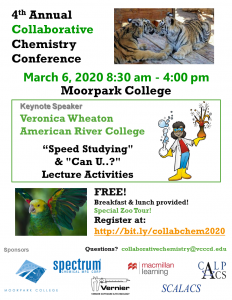SCALACS Sponsors the
Collaborative Chemistry Conference
March 6, 2020
Moorpark College

The Southern California Section is happy to again sponsor the Collaborative Chemistry Conference on March 6th at Moorpark College. This is a FREE event, but you must register. Registration is now open. Click here to register.
Please register ASAP so CCC may get an accurate headcount for meals and be able to accommodate any specific needs. Updated building/room location, directions, & parking information will be sent out to registered attendees the week of the conference.
CCC is busy building a program full of collaboration and sharing teaching ideas that they hope you will enjoy. FREE breakfast & lunch will be provided, as well as a tour of America’s Teaching Zoo at Moorpark College through the Exotic Animal and Training Management (EATM) program:
The Keynote speaker will be Veronica Wheaton from American River College in Sacramento.
Veronica’s Abstract:
I used to begin each lecture with a quiz in an effort to check student understanding of the previous lecture material before moving forward. My thought in doing so was that I was helping students with knowledge acquisition; in reality, I found that I was actually assessing their ability to memorize what happened in the previous lecture knowing that a quiz was imminent while increasing my grading pile. I adopted my “Speed Studying” and “Can U?” techniques as a way of having students interact more during lecture, practice presenting scientific information, and assess the ability to apply the information from multiple topics through discussion. The “Speed Studying” follows the introduction to the periodic table where I have students adopt an element to use during the remainder of the course. Students interact with each other on the topic given using only their knowledge and their periodic tables in timed rotations throughout the room. The “Can U?” portion is then a follow-up written exercise where students answer a prompt from me about something they learned during their interactions. This workshop will demonstrate the techniques, give an opportunity for participants to try out the techniques, and then leave time for questions and feedback. While there is nothing fancy or technologically advanced about the techniques the students seem to benefit from the practice of speaking their scientific knowledge one on one, and beginning lecture with more activity seems to help focus throughout the remainder of the lecture.
